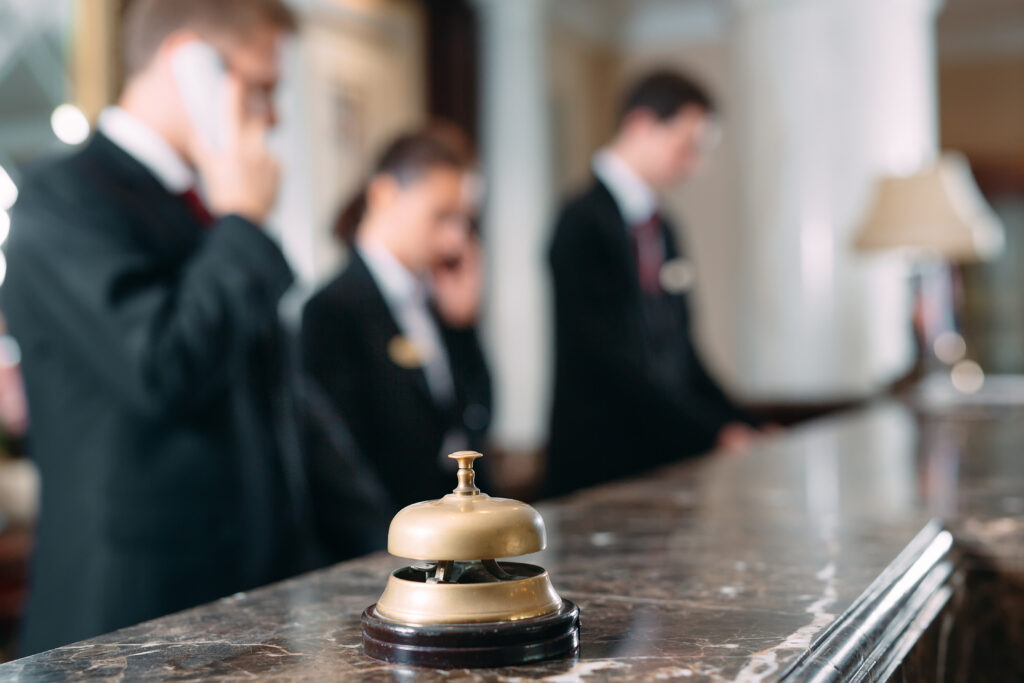A five-star rating has become shorthand for luxury—but what exactly does that rating mean when it comes to hotels? Why is the same property four-stars on one hotel search site and three-stars on another?
There’s no one organization in the United States that hands out definitive star rankings to hotels. Instead, individual hotel booking sites and other groups use their own rating system to categorize properties to help travelers know what to expect.

Expedia, which is part of the same corporation that owns many hotel booking sites such as Hotels.com and Booking.com, is one of the few sites to publish their methodology for star rankings—making it a good general reference point for figuring out what hotel star ratings really mean.
Expedia Hotel Star Ratings
| Star Rating | What Expedia Says to Expect |
|---|---|
| One-star | Basic motels, hostels, and hostels No-frills accommodations Daily housekeeping and 24/7 reception may not be available Rooms may not have private bathrooms, TVs, or phones |
| Two-star | Simple, but clean budget accommodations 24-hour reception Daily housekeeping service Rooms with private bathrooms Generally no on-site dining aside from Continental breakfast |
| Three-star | On-site restaurant and bar Baggage assistance available More spacious guest rooms with comfortable seating and good quality bedding Larger bathrooms with shower/tub combinations |
| Four-star | Larger lobbies with common space available Concierge service Valet parking Turndown service 24-hour room service Rooms with large beds, extra seating, minibars, safes, pillowtop mattresses, bathrobes Upscale toiletries provided Resorts feature spas, tennis courts, poolside food service |
| Five-star | Fine dining on-site Luxury spa Full-service health clubs Well-trained staff Welcome amenities Butler service available Elegant guestroom decor Oversized bathrooms with premium features Electronic features in-rooms such as remote-controlled shades Resorts feature golf courses, tennis courts with a variety of playing surfaces, health clubs with personal trainers, and luxurious spas |

Forbes Travel Guide Star Ratings
If you’re looking to treat yourself to an upscale hotel stay, check Forbes Travel Guide. The publication only evaluates luxury properties, and only issues stars to hotels that meet their high-quality standards. Only the best hotels will receive stars—anything below four stars that still meets the criteria to be included in the guide simply earns a “recommended” rating.
Unlike other star rating systems, Forbes Travel Guide places a high emphasis on service, saying, “Seventy percent of a property’s rating relies on its service—with a more exacting look at the guest experience as a new service metric for 2023—while the remaining 30 percent accounts for the quality and condition of its facilities.”
To evaluate hotels Forbes Travel Guide sends in inspectors who “test up to 900 rigorous standards, from modern-day luxuries—such as whether a room is set up to enhance sleep quality or whether the food-and-beverage choices support a guest’s well-being—to more traditional elements, such as the décor and the attention the staff pays to a guest.”
| Star Rating | What Forbes Travel Guide Says to Expect |
|---|---|
| Five-star | Outstanding, iconic properties with nearly flawless service. |
| Four-star | Exceptional properties with high levels of service. |
| Recommended | Excellent properties with consistently good service. |
AAA Hotel Diamond Ratings
The American Automobile Association (AAA) owns another popular hotel ranking system. Instead of stars, AAA uses diamonds to rate hotels, and ratings are refreshed yearly.
AAA Executive Director of Travel Stacey Barber tells SmarterTravel, “Each year, AAA Inspectors visit over 25,000 hotels in our portfolio, in person. We pride ourselves on giving travelers only current assessment and first-hand information about the hotels we designate.”
If you want to make sure you’re booking a truly luxurious hotel, look for the AAA Five Diamond rating—according to Barber, only 0.5 percent of properties inspected earn that coveted ranking.
Here’s how AAA explains its ratings:
| Star Rating | What AAA Says to Expect |
|---|---|
| One Diamond | A bed, a pillow, and a bargain. |
| Two Diamonds | A familiar, casual, affordable setting. |
| Three Diamonds | The comforts of home, minus the effort. |
| Four Diamonds | Splurge-worthy properties for special occasions. |
| Five Diamonds | The crown jewel. |

International Hotel Star Ratings
Hotel star rankings are not standardized across the world. In Europe, 20 countries utilize the Hotelstars Union rating system. This group aims to classify hotels with common criteria so it’s easy to tell exactly what each star rating means.
The countries that participate in this rating system are: Austria, Azerbaijan, Belgium, Czech Republic, Denmark, Estonia, Georgia, Germany, Greece, Hungary, Latvia, Liechtenstein, Lithuania, Luxembourg, Malta, Netherlands, Slovenia, Sweden, and Switzerland.
European Hotelstars Union Rating System
| Star Rating | What European Hotelstars Union Says to Expect |
|---|---|
| One-star | All rooms feature ensuite bathrooms Daily room cleaning offered TVs and WiFi in all rooms Table and chair in all rooms Soap/body wash and bath towels provided Toiletries available on request Reception service Cashless payment available Extended breakfast offered |
| Two-star | Breakfast buffet Bedside reading light Body wash or shower gel Linen shelves Bath and hand towels Bilingual staff Sewing kit and shoe polish utensils available |
| Three-star | In-person reception available at least 10 hours per day; remote reception available 24/7 Common lounge area Luggage service available Drinks available in-room Hair dryer and mirror in-room Luggage racks Laundry and ironing service available Extra pillows and blankets available Complaint management system in place |
| Four-star | In-person reception available at least 10 hours per day; remote reception available 24/7 Hotel bar or lounge area Breakfast buffet with service or seated breakfast Minibar/room service available Armchair or couch and side table in all rooms Bathrobes and slippers available Amenity kit (shower cap, nail file, etc.) Vanity mirror in bathroom International TV channels |
| Five-star | 24/7 reception service Valet parking Concierge Shuttle or limousine service Personalized in-room greeting for each guest Minbar and room service available 24 hours In-room safe Ironing, shoe polish, and sewing service available Turndown service |
Want to find five-star hotels for cheap? Check out our sister site, SmarterTravel Hotels, for big savings even on luxury properties.
You Might Also Like:
• The 8 Best Ticket Websites for Booking Day Tours and Travel Activities• The 6 Best Quiet Luxury Pieces for Travelers
• The 7 Most Controversial Travel Opinions
• Children Flying Alone: What Every Parent Should Know About Unaccompanied Minors
• Panama Travel Guide: What to Do in Panama
We hand-pick everything we recommend and select items through testing and reviews. Some products are sent to us free of charge with no incentive to offer a favorable review. We offer our unbiased opinions and do not accept compensation to review products. All items are in stock and prices are accurate at the time of publication. If you buy something through our links, we may earn a commission.
Related
Top Fares From
Today's Top Travel Deals
Brought to you by ShermansTravel
France: 8-Night Paris, Avignon & Nice...
Infinity Worldwide Vacations
 vacation
$2880+
vacation
$2880+
Poconos: 3 Nts in Garden of...
ResortsAndLodges.com
 hotel
$305+
hotel
$305+
7-Nt Canada & New England Cruise,...
Princess Cruises
 cruise
$839+
cruise
$839+





